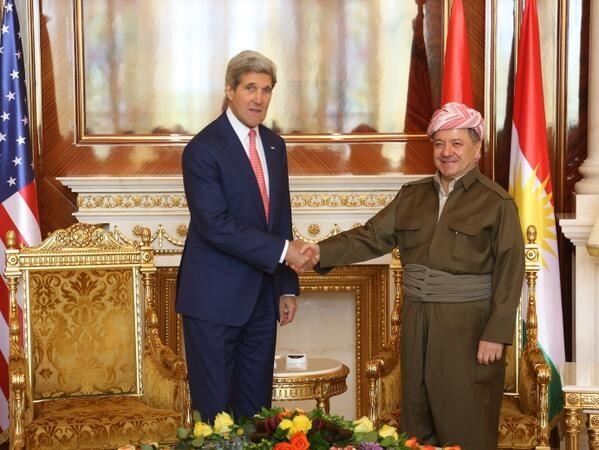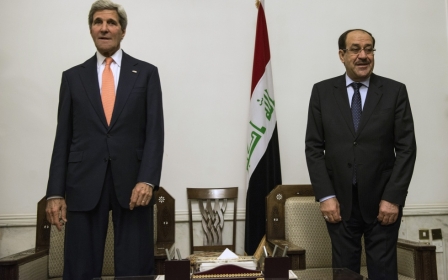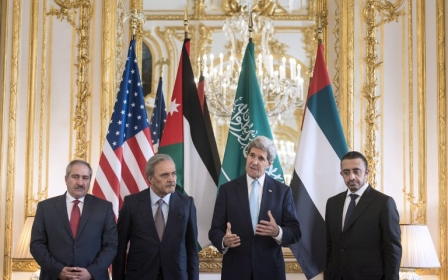Kerry presses Kurds to support new Iraqi government

In his second meeting with the Kurdish Regional Government (KRG) leadership in 10 days, US Secretary of State John Kerry called Wednesday on Iraqi Kurds to participate in the formation of the country's new government, according to a State department spokesperson.
Kerry's call throws doubt on statements from KRG President Massoud Barazani on Tuesday that a referendum will be held on independence within months, raising the spectre of the break-up of Iraq.
Kerry's comments were made during a meeting on Wednesday with a KRG delegation in Washington for discussions about security in Iraq which has endured a sustained offensive by the militant group Islamic State (IS) and its allies for nearly a month.
"The secretary emphasized the need for their full participation to the new Iraqi Parliament convened to move the process forward, to forge an inclusive government that takes into account the rights, aspirations and legitimate concerns of all of Iraqis," said State Department spokeswoman Jen Psaki.
Psaki said that the US expected Kurdish politicians to attend a parliamentary meeting scheduled for 8 July, after they walked out last week, and said the US supports Iraq's unity, not Kurdish independence.
"A united Iraq is a stronger Iraq and the focus should be on the existential threat that all Iraqis face," said Psaki.
The US position contradicts calls over the past week from Israeli officials, including Prime Minister Benjamin Netanyahu, for the international community to support the aspirations of the Kurds for independence.
Barzani warned last week that there was no going back on Kurdish rule in the oil-rich northern city of Kirkuk and other towns now defended by Kurdish fighters against Sunni militants.
The Kurdish Regional Government's defence forces - called the Peshmerga - seized control of Kirkuk after the Iraqi army pulled out of the area in mid-June, following a major offensive by IS-led armed insurgents.
US reaches out to regional leaders
Top US officials also upped pressure on key Iraqi leaders on Wednesday as political chaos in Baghdad clouded American hopes for a unity government to tackle the country's breakdown.
President Barack Obama meanwhile widened US efforts to convince key regional powers to prevail on Iraqi factions for a political settlement, calling on Saudi Arabia's King Abdullah for his assistance.
Vice President Joe Biden talked to the speaker of Iraq's previous parliament, Osama al-Nujaifi, a prominent Sunni leader. The White House said that the two agreed on the importance of Iraqis "moving expeditiously to form a new government capable of uniting the country."
The first session of Iraq's new parliament, dedicated to choosing a new government, broke up in chaos on Tuesday, with lawmakers walking out and making threats, despite the gravity of the political and security situation.
Many Sunni and Kurdish deputies walked out, causing a quorum to be lost, so a speaker could not be elected, and the session ended in disarray.
Washington has made no secret of the fact that it does not believe Prime Minister Nuri al-Maliki is the man to lead the new government, blaming him for pursuing sectarian policies which the US government believes helped prepare the ground for the IS advance.
But no consensus has emerged on who should succeed Maliki and the prime minister seems determined to cling to power, offering amnesty to militant fighters ravaging the country on Wednesday.
Under a de facto agreement, in Iraq, the premier of the government is a Shiite Arab, the speaker Sunni Arab and the president a Kurd.
New MEE newsletter: Jerusalem Dispatch
Sign up to get the latest insights and analysis on Israel-Palestine, alongside Turkey Unpacked and other MEE newsletters
Middle East Eye delivers independent and unrivalled coverage and analysis of the Middle East, North Africa and beyond. To learn more about republishing this content and the associated fees, please fill out this form. More about MEE can be found here.




